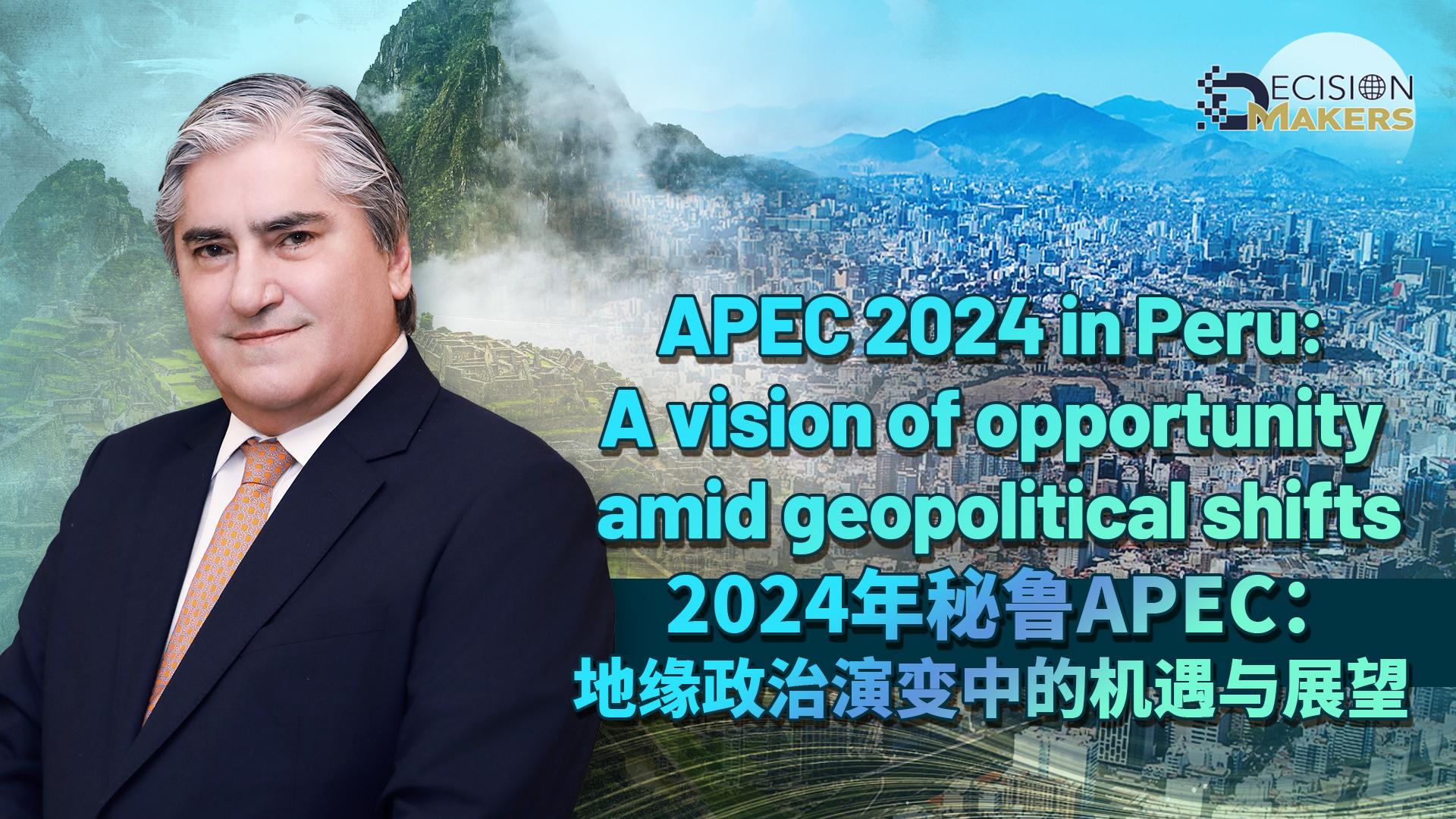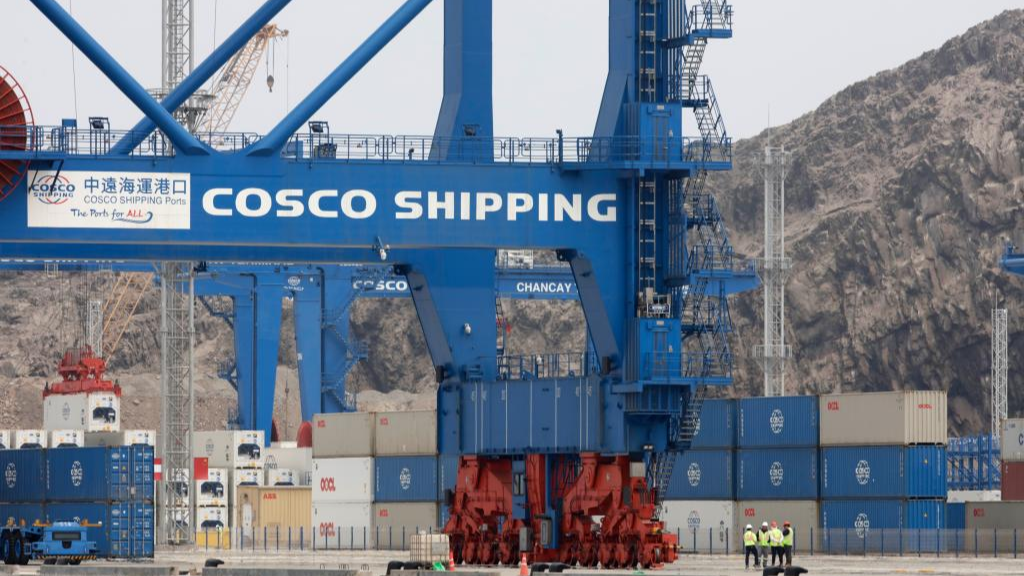
Editor's note: Decision Makers is a global platform for decision makers to share their insights on events shaping today's world.
By Marco V. Balarezo
This month, Peru will host the Asia-Pacific Economic Cooperation (APEC) Economic Leaders' Meeting for the third time, following successful editions in 2008 and 2016. As the world continues to navigate complex geopolitical shifts and economic challenges, APEC Peru 2024 arrives as a significant opportunity for Peru to push for collective decisions and actions to achieve economic growth and prosperity in the Asia-Pacific region. What can we expect from this event, and how will Peru seize this moment to boost its domestic economy?
Strengthening multilateral ties for economic integration
APEC has always been a fundamental pillar of economic and sectoral cooperation, fostering integration among the world's most dynamic economies. For Peru, this meeting is the most prestigious platform for engaging directly with global economic leaders. The opportunity to host APEC again underscores its strategic importance to Peru in the Asia-Pacific region and its commitment to facilitating regional dialogue, cooperation, sharing experiences and maintaining a stable and peaceful environment.
Particularly, over the last 35 years APEC has played an essential role in promoting trade and investment, and today Peru aims not only to continue this trajectory but also push forward critical initiatives in the new reality such as digital economy integration, green energy transitions and inclusive and sustainable economic growth.
One of the most significant milestones achieved under Peru's APEC presidency has been the restoration of consensus within the forum after a challenging period when agreement was elusive. To date, 15 key outcomes have been approved unanimously, covering 10 ministerial declarations and five technical-political instruments on themes like economic inclusion for people with disabilities, women and trade, low-emission hydrogen development, sustainable finance and energy transitions in the Asia-Pacific.
During the APEC Economic Leaders' Meeting from November 10 to 16, Peru expects to approve four new ministerial declarations, the most important one being the leaders' declaration on a roadmap for the transition for a global and formal economy.
Leveraging APEC for domestic economic boost
Hosting APEC 2024 offers Peru an extraordinary opportunity to bolster its domestic economy, not just through the direct economic benefits of hosting thousands of delegates and participants but also by showing and enhancing investment opportunities. The anticipated participation of 5,000 delegates in the Leaders' Meeting, 1,200 CEOs and leaders in the APEC CEO Summit, and 2,500 journalists positions APEC 2024 as perhaps one of the largest gatherings in APEC's history. This level of engagement provides a unique platform for Peru to project itself as a solid and reliable partner, to present its investment opportunities and reaffirm its sound macroeconomic fundamentals and solid regulatory and legal framework for investment in the Asia-Pacific and the rest of the world.
The economic dynamics in the APEC region already reflect substantial growth, with exports to APEC economies representing 68.5 percent of Peru's total international transactions in 2023. Since joining APEC in 1998, Peruvian exports to APEC economies have multiplied by 14.7 times, demonstrating the forum's importance for Peru's economic growth. With over 70 percent of Peruvian companies exporting to APEC being micro and small enterprises, the Asia-Pacific provides a critical region of opportunities and incorporation in the regional and global supply chains.
An updated free trade agreement (FTA) between Peru and China, set to be signed during President Xi Jinping's upcoming visit, is another example of how APEC 2024 will bolster the economy. The enhanced FTA with China aims to incorporate the global supply chain, environmental protection and e-commerce, areas that are drastically reshaping international trade. This trade deal will not only enhance the volume of transactions but also broaden the scope for non-traditional sectors, such as agricultural and high-value fisheries exports, encouraging diversification away from a heavy reliance on mineral exports.

The construction of the Chancay Megaport, built 80 kilometers north of Lima, capital city of Peru, October 29, 2024. [Photo/Xinhua]
Chancay Megaport and strategic ambitions
The $3.6 billion Chancay Megaport project north of Lima, set to become fully operational shortly after the APEC meeting, is a critical asset in Peru's infrastructure. It represents one of the largest port investments in South America by China's COSCO Shipping and Peruvian enterprise Volcan, transforming the Port of Chancay into a major hub for international trade in the Pacific. The deep-water port aims to open a fast and direct line between Latin America and Asia, significantly reducing the dependency on intermediary routes through Mexico or the United States, and establishing Peru as a gateway for South American trade to Asian markets.
The Port of Chancay is the starting point of a major economic transformation of Peru that will be done with the creation of logistical, industrial and technological parks and special economic zones in Chancay and Ancon district of Lima. Peru invites all APEC enterprises to invest in this near-term endeavor.
Green energy and digital transformation
Another key priority for APEC Peru 2024 is the promotion of green and digital transitions. Peru has already engaged deeply in dialogues concerning a fair and sustainable energy transition, a topic that resonates well within the APEC community. In a time when global energy dynamics are shifting rapidly, Peru's efforts to promote hydrogen-based energy and other green alternatives within the APEC framework align with its broader domestic goals of enhancing energy security and mitigating environmental impacts.
In addition, the digital transformation agenda offers Peru an opportunity to close existing development gaps. The high-level APEC forum "Challenges and Opportunities of Digitalization in the Asia-Pacific Region" organized by Peru's Ministry of Foreign Affairs, Digital Democracy, and the Electronic Engineering Chapter of CIP (Peruvian Engineers Association) last month aimed to deepen cooperation on digital matters, share experiences and best practices, and highlight the benefits of digitalization to the population.
Challenges and the path forward
APEC 2024 presents Peru with a unique opportunity to solidify its leadership in fostering regional cooperation amidst increasing global competition. The goals are to ensure that cooperation prevails over systemic competition and conflict. Peru hopes that the commitments and roadmaps agreed upon during APEC 2024 will materialize into practical and beneficial actions and to realize the APEC Putrajaya Vision 2040 – a set of priorities endorsed by APEC leaders in 2020 for the next two decades, including the creation of a Free Trade Area of the Asia-Pacific (FTAAP) within the APEC framework, thus enhancing regional integration.
Moreover, Peru will emphasize the importance of formalizing the economic actors within the APEC economies. The formalization of the informal sector is a major priority due to the fact that more than 70 percent of Peru's economy is informal. This focus is aligned with the broader priority of "Innovation and digitalization to promote transition to the formal and global economy," which Peru proposed as one of the central themes for APEC 2024.
To facilitate this transition, Peru will present a roadmap that includes structural reforms related to pension systems, labor standards and regulations, which are essential to managing the shift towards formalization. Financial inclusion, digital access and the ability to access public services are also vital components of this roadmap. Notably, digital tools have been identified as instrumental in reducing informality by lowering transaction and registration costs, thereby making it easier for enterprises to formalize.
The roadmap will cover a five-year horizon, with annual reviews to assess progress among member economies. The aim is for these recommendations to have the legitimacy of collective decision-making within APEC, providing Peru with access to cooperation and expertise from organizations like the Organisation for Economic Co-operation and Development to strengthen public policies aimed at reducing informality.
To summarize, as Peruvian Foreign Minister Elmer Schialer Salcedo stated, one of the legacies that Peru hopes to leave from its pro-tempore presidency of the APEC forum is to move towards a comprehensive free trade area in the Asia-Pacific and the transition from an informal economy to a formal one, a problem that affects Peru and several economies in the region – along with the APEC for the People initiative – as a permanent line of action in the region.
A bright horizon for Peru and APEC
In conclusion, APEC Peru 2024 represents an extraordinary moment for Peru to advance its domestic and regional agendas. By focusing on themes of economic inclusion, sustainability, digital transformation and infrastructure development, Peru is positioned to enhance its role as a strategic actor within the Asia-Pacific region. The Chancay Megaport, renewed trade agreements, and commitments to energy transition and digital innovation are all elements that contribute to Peru's vision for a modern, integrated economy.
The APEC Economic Leaders' Week (AELW) will be the highlight of Peru's APEC presidency in 2024, culminating in discussions centered around inclusive and interconnected growth, formalizing the economy and fostering sustainable development. The AELW includes several key meetings, including the concluding senior officials' meeting, the annual ministerial meeting and the 31st APEC Economic Leaders' Meeting, under the theme "Empower. Include. Grow."
Peru has shown through its stewardship of APEC that small nations can exert considerable influence in shaping global economic policies. By emphasizing cooperation over conflict and inclusivity over isolation, APEC 2024 stands as a testament to the idea that prosperity and economic inclusive growth can be achieved in a way that benefits all partners. As Asia-Pacific leaders gather in Lima, Peru is ready not only to host but to lead – proving once again that the nation's voice is one of hope, partnership and progress in the Asia-Pacific region.
Marco Balarezo is Peru's ambassador to China.

 中文
中文



